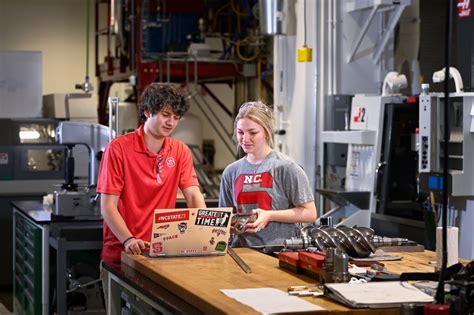The industrial engineering program at North Carolina State University (NC State) is consistently ranked among the top programs in the nation. With a focus on real-world applications, the program prepares students to become successful engineers in a wide range of industries.

Industrial Engineering at NC State
Industrial engineering is the branch of engineering that deals with the design, improvement, and installation of integrated systems of people, materials, information, equipment, and energy. Industrial engineers work to optimize processes and improve productivity in a variety of settings, including manufacturing, healthcare, logistics, and service industries.
The NC State industrial engineering program offers a Bachelor of Science degree in industrial engineering, as well as Master of Science and Doctor of Philosophy degrees. The undergraduate program is accredited by the Accreditation Board for Engineering and Technology (ABET).
Faculty and Research
The NC State industrial engineering faculty is comprised of world-renowned experts in their fields. The faculty are actively involved in research, which helps to keep the program at the forefront of the latest advancements in the field.
The department’s research focuses on a variety of areas, including:
- Human factors engineering
- Ergonomics
- Operations research
- Supply chain management
- Manufacturing systems
- Data analytics
Student Life
The NC State industrial engineering program offers a variety of student organizations, including:
- The Industrial Engineering Honor Society
- The Society of Manufacturing Engineers
- The Institute of Industrial Engineers
- The Human Factors and Ergonomics Society
These organizations provide students with opportunities to network with other students, participate in professional development activities, and learn about the latest trends in the field.
Career Opportunities
Graduates of the NC State industrial engineering program are in high demand by employers. The program’s graduates have gone on to successful careers in a wide range of industries, including:
- Manufacturing
- Healthcare
- Logistics
- Service industries
- Consulting
Six-Step Approach: Top Strategies to Succeed in NC State’s Industrial Engineering Program
Industrial engineering plays a pivotal role in shaping technological advancements across various industries. NC State’s industrial engineering curriculum cultivates professionals who drive innovation and streamline operations. To excel in this program, adopt these essential strategies:
- Embrace a Growth Mindset: Foster a mindset that welcomes challenges as opportunities for learning and growth. Embrace feedback and actively seek ways to improve.
- Develop Analytical Acuity: Hone your analytical abilities to identify patterns, interpret data, and develop logical solutions. Engage in problem-solving activities and utilize analytical tools.
- Cultivate Communication Skills: Effectively communicate your ideas, findings, and recommendations to diverse audiences. Practice presenting your work and engaging in discussions.
- Foster Team Collaboration: Collaborate effectively with peers in group projects and assignments. Utilize teamwork as a catalyst for knowledge exchange and innovative solutions.
- Leverage Technology: Embrace industry-standard software and tools used in industrial engineering, such as data analysis software, simulation tools, and optimization techniques.
- Seek Real-World Experience: Engage in internships or research opportunities to apply your knowledge in practical settings. Gain valuable hands-on experience to complement your coursework.
FAQs: Frequently Asked Questions about NC State’s Industrial Engineering Program
Q1. What sets the NC State Industrial Engineering program apart?
A1. NC State’s program emphasizes hands-on learning, extensive research opportunities, and industry collaborations, preparing graduates to excel in diverse engineering roles.
Q2. What career paths are available to industrial engineering graduates?
A2. Graduates pursue careers in manufacturing, healthcare, logistics, consulting, and other sectors where process optimization and efficiency enhancement are crucial.
Q3. What are the admission requirements for the program?
A3. Admission to the program typically requires a strong academic record, including coursework in mathematics, science, and engineering fundamentals.
Q4. Does the program offer financial assistance?
A4. NC State offers various scholarships, grants, and assistantships to support students pursuing industrial engineering, based on merit and financial need.
Q5. How does the program integrate sustainability principles?
A5. The program incorporates sustainability concepts into coursework and research, emphasizing the role of industrial engineers in promoting environmentally responsible practices.
Q6. What opportunities are available for undergraduate research?
A6. Students can participate in faculty-led research projects, gaining hands-on experience in cutting-edge industrial engineering domains.
Table 1: Industrial Engineering Curriculum at NC State
| Year | Courses |
|---|---|
| Freshman | Calculus, Physics, Engineering Design, Introduction to Industrial Engineering |
| Sophomore | Statistics, Operations Research, Manufacturing Processes, Ergonomics |
| Junior | Supply Chain Management, Data Analytics, Human Factors Engineering, Engineering Economics |
| Senior | Capstone Project, Industrial Engineering Applications, Simulation Modeling, Optimization Techniques |
Table 2: Key Statistics about NC State’s Industrial Engineering Program
| Statistic | Value |
|---|---|
| Number of faculty | 25 |
| Number of undergraduate students | 450 |
| Number of graduate students | 100 |
| Average starting salary for graduates | $70,000 |
| Percentage of graduates employed within 6 months of graduation | 95% |
Table 3: Industrial Engineering Research Centers at NC State
| Center | Focus |
|---|---|
| Center for Integrated Manufacturing Studies | Advanced manufacturing technologies and processes |
| Center for Human Factors and Ergonomics | Human-system interaction, safety, and well-being |
| Center for Supply Chain Research | Supply chain optimization, logistics, and transportation |
Table 4: Industries that Hire NC State Industrial Engineering Graduates
| Industry | Percentage of Graduates Employed |
|---|---|
| Manufacturing | 30% |
| Healthcare | 20% |
| Logistics | 15% |
| Service Industries | 15% |
| Consulting | 10% |
| Other | 10% |
